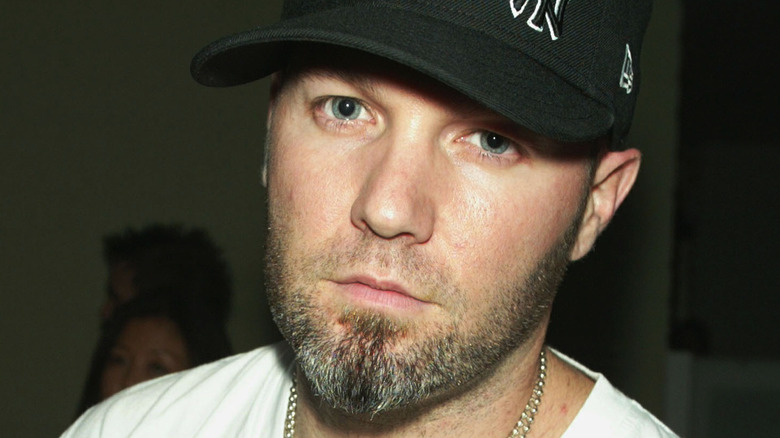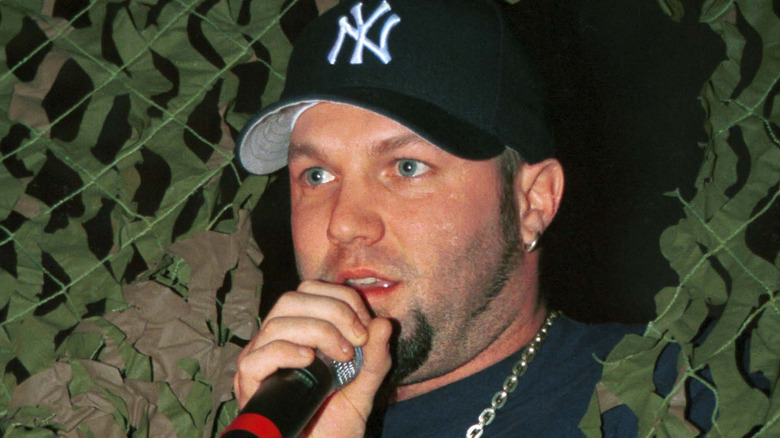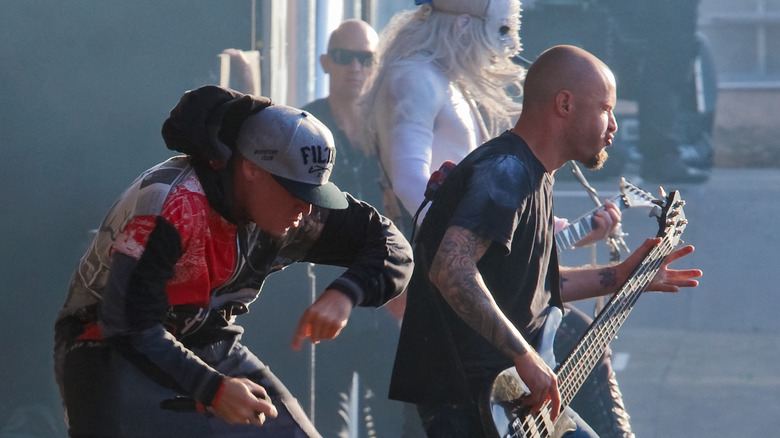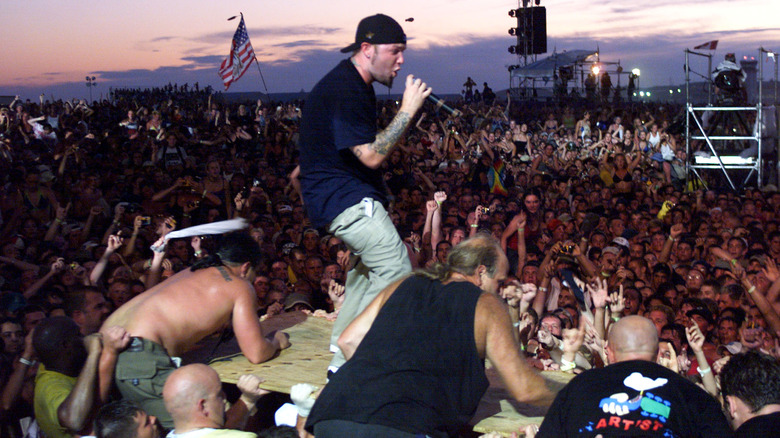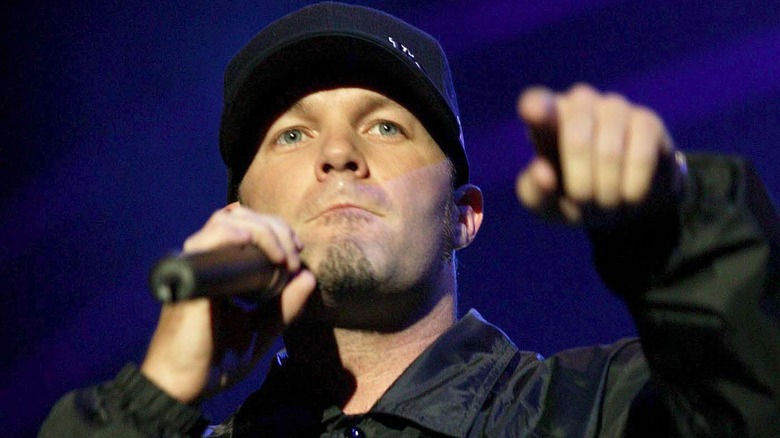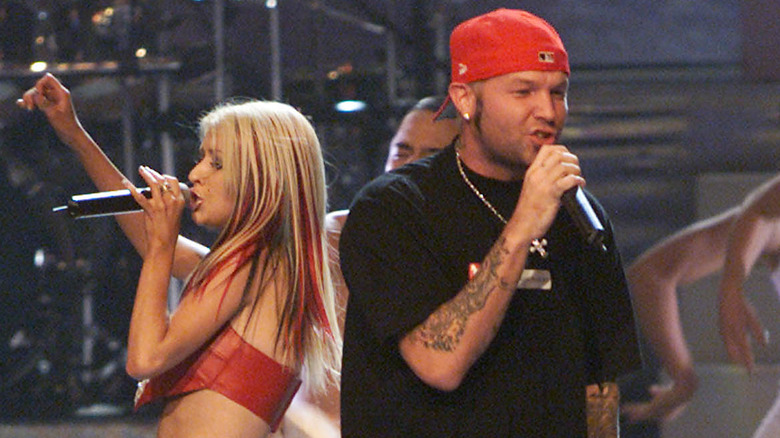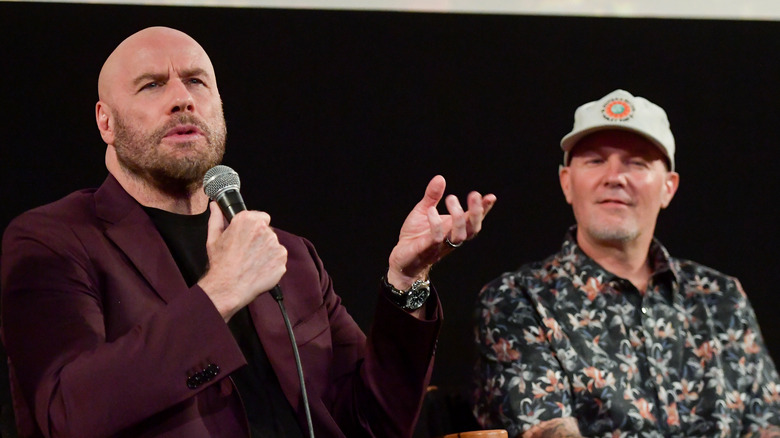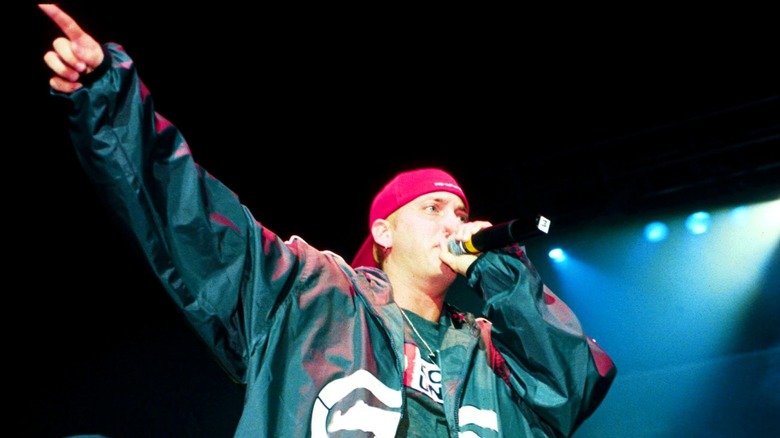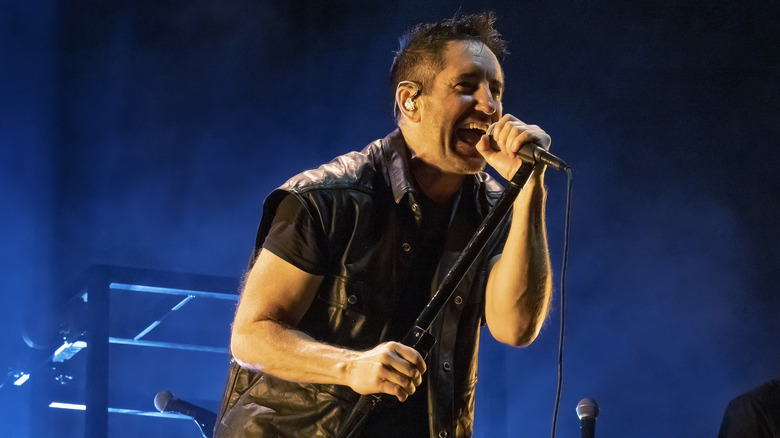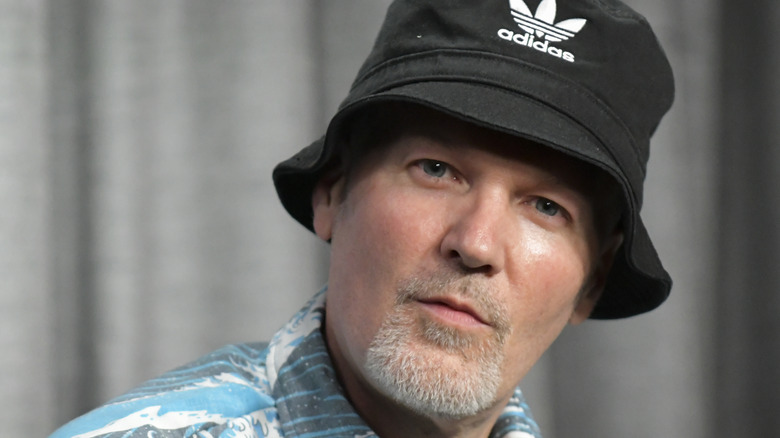The Untold Truth Of Fred Durst
Ahead of its U.K. and European leg, Limp Bizkit's "Still Sucks" tour came to a halt in 2022 over concerns about the health of its front man, Fred Durst (per CNN). Durst's message to fans regarding the delay was brief, measured, and polite — quite a ways away from the public persona he's built up over the years, that of the red-capped loudmouth ready to insult anyone. "I'm Dr. Frankenstein and that's my creature," he once told Louder. "It was a conscious effort to create Fred Durst and eventually I had to bring that guy out more than I wanted to ... I had to check into that character — the gorilla, the thing, the red cap guy. It's a painful transformation, but I do it 'cos that's what I was taught to do when you have people pulling at you."
For someone with such a surly reputation, Durst has shown considerable networking talent over the years. It was his courtship of Korn, according to Colin Devenish's "Limp Bizkit," that got the band's demos out to the right people. Per Kerrang!, he engineered numerous collaborations with other bands on several Limp Bizkit records. And despite his feuds with other groups and organizers, band members quitting and rejoining, and nu metal's general decline, Durst has managed to pull Limp Bizkit back together, keep it going to the present day, and carve out a niche for himself making movies on the side.
Fred Durst had a difficult childhood
Fred Durst was born in Jacksonville, Florida, on August 20, 1970. His birth name was Frederick Allen Mayne III. But after his father abandoned the family, his mother took the family to Gastonia, North Carolina, remarried, and Frederick Mayne became William Frederick Durst, according to the Mirror (via the Free Library). Anita Durst was a church worker, while stepfather Bill was a police officer. In an interview with the Florida Times-Union, they remembered young Fred as a typical child, involved in sports, managing average grades, and flirting with the girls in high school.
Durst remembers things a little differently. "I'm really proud to have grown up [in Gastonia] and I miss it," he said in an interview with the Shelby Star. In the same interview, however, Durst claimed that he had "a very minimal existence" in high school, where he had few friends. He described himself as a "redneck f*****" to the Mirror, who was regularly sent to his room. More than that, he claimed that his love of rap music and having Black friends made him a target for bullies. His resentment toward his childhood tormentors has been fuel for his work. "I believe my creative spirit is definitely vengeful," he told the Shelby Star.
Whether his parents knew about the force behind Durst's music, they've come to enjoy it. "I didn't really care for [his first album]," said Bill. But on the second, there were only two songs that didn't meet his approval.
He was (briefly) in the Navy
The image Fred Durst gave of his youth to Kerrang! was that of an outcast and anti-authoritarian, often confined to his room for clashing with his policeman stepfather. He was a skateboarding punk swept up in alternative music and Michael Jackson, and without any good grades or ready job skills once he made it out of high school. "I was such a f****** loser," Durst said of himself at that age to Rolling Stone (via Colin Devenish's "Limp Bizkit.") "I thought, 'My dad can't stand me, man.'" It was out of a desire to make his stepfather proud that Durst enrolled in the U.S. Navy.
Despite that wholesome motive, Durst's time in the service was far from an unblemished record of clean living. Stationed in California, he fathered a child and then ended up behind bars after he, his ex-wife, and his ex-wife's boyfriend got into a fight. Looking back on that time in his life for the Mirror (via the Free Library), he said, "Being in the Navy was like being in prison. I was in boot camp, my head was shaved, and they were spitting on me. I made the biggest mistake of my life."
Durst was honorably discharged after just one year in the Navy, following a skateboarding accident. One of his first moves once out was to go to work with his stepfather, cutting lawns in Jacksonville, Florida.
Fred Durst named his band to turn off critics
The names of bands don't always have an immediately apparent logic. Frank Sinatra and the Tommy Dorsey Orchestra is self-explanatory, but what about Slipknot? Bowling for Soup? Even The Beatles doesn't have any obvious meaning – and, if you ask Rolling Stone, it's one of the worst names for a musical act ever. But whatever meaning, if any, lies behind these names, the musicians who came up with them weren't out to alienate anybody with their monikers.
Not so with Fred Durst and Limp Bizkit. According to Colin Devenish's "Limp Bizkit," when Durst and the rest came together to form a band, they assumed that critics would be against them and decided to get one step ahead of them and any general listeners inclined to doubt based on labels. "The name is there to turn people's heads away," said Durst. "A lot of people pick up the disc and go 'Limp Bizkit. Oh, they must suck.' Those are the people that we don't even want listening to our music."
The given origin of the name "Limp Bizkit" is that it was an insulting nickname Durst came up with for a roadie. By coincidence, it's also one of the names for an adolescent sex game in Australia, or so Durst was told. "That should make things interesting when we play there," said Durst.
He and his band aren't friends
Speaking about his time on "The Simpsons" on the podcast Smells Like Human Spirit (via Vox), writer Sam Simon said, "People you work with, they aren't necessarily your friends. You don't have to read anything into that."
The same seems to be true of Fred Durst and Limp Bizkit. In an interview with Louder, Durst claimed that the first time he met his band's guitarist, Wes Borland, was at their first live performance, after the other band members had taught Borland their music. "We never took the time to consider friendships," he went on. "That wasn't part of it. It was just about the magic that happened when we were together ... none of us were ever friends." Later in the interview, he claimed to have never become emotionally attached to another human being.
Durst's bandmates, for their part, have run into difficult times with their frontman, and several have walked away from the group. Borland left in 2001. According to Spinditty, he didn't like the musical direction Durst was taking or Durst's tendencies toward "selling out" and making Limp Bizkit all about himself. The two erstwhile partners got into a feud over MySpace after Borland's departure, and Limp Bizkit's albums immediately after losing him were not well-received. But after three years away, Borland came back into the fold, according to MTV. Turntablist DJ Lethal has also come and gone, per Billboard.
Fred Durst was blamed for the Woodstock '99 riots
The original Woodstock of 1969 was a watershed moment for the counterculture movement and is widely looked upon as an expression of peace, harmony, and free love. The Woodstock '99 anniversary festival would not have such a pleasant legacy. "Woodstock '99 ends in fiery chaos" ran the headline in the Eugene Register-Guard, above a tale of fires, riots, looting, and vandalism. State troopers and city police were needed to bring the situation under control.
And it started — so some say — with Limp Bizkit. According to Variety, it was during their set that riotous fans began acting up, ripping up plywood rafters to crowd surf. Fred Durst joined in the surfing, according to Colin Devenish's "Limp Bizkit," ignorant of the growing violence in the mosh pit that included a sexual assault. When up on the stage, Durst encouraged the crowd not to relax. "That's what Alanis Morissette had you m***********s do," he said. While he asked that the crowd not let anyone get hurt, he also encouraged people to let out their "negative energy" during a performance of the song "Break Stuff" (via YouTube).
The fires and full-blown rioting didn't start until the next night, but festival promoter John Scher has since targeted Durst for inciting the violence, claiming he was "a complete a****** ... a moron ... he was completely out of his mind." But members of Korn and Primus defended Limp Bizkit, and Durst has maintained that fault lies with the festival's organizers.
A girl died at one of his concerts
In defending himself against claims his on-stage remarks set off the riots at Woodstock '99, Fred Durst argued: "I didn't see anybody getting hurt. You don't see that. When you're looking out on a sea of people and the stage is 20 feet in the air ... how do they expect us to see something bad going on" (per Colin Devenish's "Limp Bizkit"). He would face a similar situation two years later in Australia when performing on the Big Day Out Tour.
According to Double J, Limp Bizkit repeatedly clashed with the event organizers. On the Auckland leg of the tour, Durst dismissed security's requests to help calm an unruly audience and threw water over the personnel. In Australia, according to Billboard, an even more animated crowd in the mosh pit surged toward the stage during Limp Bizkit's set. Security signaled for a halt to the music when people started going to the ground. Durst told the crowd to pick up anyone who fell, but after the crowd was pushed back and the music resumed, 16-year-old Jessica Michalik's unconscious body was recovered from the pit. She died five days later.
Durst blamed the event organizers for inadequate security measures and refused to directly answer questions from the Australian police. He and Limp Bizkit were ultimately absolved of responsibility for the death, but the coroner found Durst's remarks during the incident "inflammatory and indeed insulting to the security staff" (per MTV).
Fred Durst's work with Christina Aguilera and Britney Spears was scorned
Rock and pop aren't the most disparate of musical genres. Nevertheless, for some rock n' rollers, crossing over to the other side is disgraceful behavior. So when Fred Durst teamed up with Christina Aguilera for a duet at the 2000 MTV Video Music Awards, it was another occasion for his critics to pounce. Richard Patrick of the rock group Filter told MTV News that "Fred getting onstage with Christina Aguilera embarrassed us all." At the time, Durst referenced one of his own songs to explain his decision to perform the duet: "I did it all for the n*****, man."
His collaboration with Britney Spears also attracted controversy, though not for the same reasons. Durst was hired by Spears as a songwriter in 2003. He claimed in a statement to his fans — not all of them pleased with the team-up — that the relationship turned romantic, which Spears was quick to deny (per MTV News). Durst wasn't shy in complaining about the denial, airing his grievances on Howard Stern. In the same interview, he claimed to have denied permission for Spears to use any of the songs he wrote.
In a 2020 interview with Louder, he provided a more serious response to critics of his team-ups with Aguilera and Spears. "What's the problem?" he said. "Because they make a type of music we aren't allowed to like ... why segregate? Why be so musically f****** racist?"
He's moved into movies
To hear Fred Durst tell it, movies were his passion before music. "I always wanted to be a film director," he told Black Film, "and along the way I had a wonderful time with the success of music, and I think it was a natural stepping stone for me to be behind the camera." He dipped his toes into directorial waters with music videos for Limp Bizkit in the late '90s. Shortly after, Korn hired him to do the video for their song "Falling Away from Me" and were well-pleased with the results. "It was shot really well," frontman Jonathan Davis told MTV (via Colin Devenish's "Limp Bizkit"). He also praised Durst for developing the video's concept of Korn's music as salvation for lost or depressed children.
Durst was happy to discuss his movie ambitions in interviews. Per Devenish's book, he told All Music that he had a strong vision for films as a future director and screenwriter, boasting: "Everything that I become involved with becomes successful. My hit-to-miss ratio is zero — all hits so far." In another interview with Request, he claimed, "I see myself as a kind of Dr. Dre-meets-Steven Spielberg. That's me all the way." But when Durst made his feature film debut as a director with "The Education of Charlie Banks," he garnered only mixed reviews, a trend that's held throughout his career. His last film to date, 2019's "The Fanatic," was a box office bomb (per Hollywood Reporter).
Fred Durst's long list of feuds
Fred Durst has given up his once-signature red cap and soul patch, and has told VICE and Louder of his desire to shed the abrasive persona that went with them. He's found it difficult to do so. Part of that may stem from the many public feuds he's had over the years, to varying degrees of seriousness.
Durst has picked fights with event organizers, the press, and fellow members of Limp Bizkit, but it's his conflicts with other musicians that have garnered headlines. Sometimes, the fights have been indirect and more of a publicity coup than a deeply-held resentment. In 1999, according to MTV, Slipknot vocalist Corey Taylor mentioned at a New York concert that Durst had called Slipknot fans "fat, ugly kids" and snapped back for the crowd to hear, but declined further public escalation, preferring to settle things with Durst directly. Durst's fight with his one-time friend Eminem was similarly brief in the public eye, though it did result in Eminem cutting a diss track against Durst and Limp Bizkit turntablist DJ Lethal (per MTV).
The feud between Limp Bizkit and Placebo was more direct. According to NME, Durst was asked to introduce Placebo at a New York concert when he and Brian Molko had an altercation. When Durst went on to make the introduction, he encouraged the crowd to chant, "Placebo sucks." Molko countered that Bizkit brought a "bad vibe" to the Big Day Out Tour that the bands were on together.
Insults from an idol got him a song
The warning "don't meet your heroes" isn't universally true. But sometimes, it's not even necessary to meet for a hero to disappoint. Among Fred Durst's influences as a musician is Nine Inch Nails. Their frontman, Trent Reznor, has been known to shoot off insults, even to his fans. In 2000, he told Kerrang! (via the NIN Hotline) just what he thought of Limp Bizkit. "It's one thing if you know your place, like, 'Hey, I'm an idiot who plays s***** music, but people buy it, f*** it, I'm having fun.' But it's another thing when you think you're David Bowie after you've stayed up all night to write a song called 'Break Stuff.'" Of Durst himself, Reznor said, "[He] might be a cool guy, I don't know him. But his 'art' — in the word's loosest sense — sucks."
Speaking to Rock Sound years later, Durst claimed he and Reznor have since had a chance to meet on friendly terms. But he admitted to being hurt by the remarks. "There was all this negativity in the press, my idols and people in great bands, Trent Reznor and different people talking s*** about me." Durst's resentments fueled Limp Bizkit's next album, "Chocolate Starfish and the Hot Dog Flavored Water." A track on the album made extensive use of NIИ's chords, so much so that they needed Reznor's permission (per NME). He granted it. "I wasn't gonna hold [Durst's] record up."
Fred Durst's comments about Russia got him banned in Ukraine
Fred Durst may not be the most prominent celebrity ever caught under the sway of a dictator, but he can claim a distinction: he was banned from one country for his remarks about its neighbor. Limp Bizkit has a surprisingly large following in Russia, and after emerging from a long hiatus, they performed there in 2009, 2012, and 2013 (per Foreign Policy). Ahead of a 2015 tour, Durst spoke to Russian radio and suggested he might seek a Russian passport and settle in Crimea — a place not recognized as Russian by the rest of the world, but part of Ukraine.
Moscow was quick to seize on the comment for publicity purposes. Izvestia reported (via Radio Free Europe) that Durst wrote a letter to Crimean authorities expressing admiration for Vladimir Putin and confidence that he could help the Russian state. He even suggested he could energize the Russian film industry by moving to Crimea (per Billboard).
In response, the Ukrainian security service decided to ban Durst from entering Ukraine for five years. Per the BBC, it was treated as a matter "in the interests of guaranteeing the security" of Crimea, which Ukraine claims sovereignty over.
